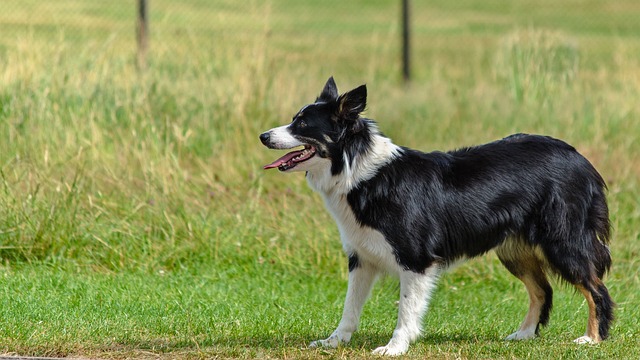
Border Collies are a popular breed of dog known for their intelligence, agility, and herding abilities. However, one question that often arises when it comes to these dogs is whether or not they are stubborn. The answer to this question is not straightforward, as it can depend on a variety of factors.
Firstly, it’s important to understand the history of the Border Collie breed. These dogs were originally bred in Scotland for their herding abilities, and later became popular in Australia as well. Due to their working background, Border Collies are known for being highly focused and driven, which can sometimes be interpreted as stubbornness. However, this trait is actually a result of their natural instincts and desire to work.
When it comes to training Border Collies, it’s important to take their unique personality and temperament into account. Some individuals may be more stubborn than others, but with patience, consistency, and positive reinforcement, most Border Collies can be trained successfully. It’s also important to provide them with plenty of mental and physical stimulation, as they thrive on challenge and activity. Overall, while Border Collies may have a reputation for being stubborn, it’s important to approach their training with understanding and respect for their natural instincts and abilities.
Understanding Border Collie’s Personality
Border Collies are a unique breed of dog, known for their energy, and loyalty. However, they can also be considered stubborn by some owners. Understanding their personality can help you better train and care for your Border Collie.
Border Collies are highly intelligent dogs, which can make them challenging to train. They are quick learners and are always eager to learn new things. However, they can also become bored easily, which can lead to stubbornness and disobedience.
In addition to being intelligent, Border Collies are also very energetic and active. They were bred to be workaholics, which means they need plenty of exercise and mental stimulation to stay happy and healthy. Without enough exercise and stimulation, they can become destructive and difficult to manage.
Despite their high energy and intelligence, Border Collies are also very loyal to their owners. They form strong bonds with their families and are always eager to please. This loyalty can sometimes lead to separation anxiety if they are left alone for long periods.
Border Collie’s Herding Instinct
Border Collies are a breed of herding dogs that were originally developed in the border regions of Scotland and England. These dogs are known for their exceptional herding instincts, which make them excellent working dogs on farms and ranches.
Herding is a natural instinct for Border Collies, and it is something that they are born with. This instinct is deeply ingrained in their DNA, and it is what makes them such effective working dogs. When Border Collies are herding, they use a combination of their natural instincts and their training to control and move livestock.
The herding instinct in Border Collies is so strong that it can sometimes be difficult to train them to do anything else. This is why they are often considered to be stubborn dogs. However, it is important to remember that their stubbornness is simply a result of their strong herding instincts.
Border Collies are excellent at their job because they are able to anticipate the movements of livestock and respond quickly to changes in their behavior. They are also able to work for long periods of time without getting tired, which makes them ideal for working on large farms and ranches.

Physical Characteristics of Border Collies
Border Collies are a medium-sized dog breed, with males typically weighing between 30-45 pounds and females weighing between 27-42 pounds. They have a well-proportioned body and are known for their agility and athleticism.
The coat of a Border Collie can come in a variety of colors, including black, red, and white, with some dogs having a combination of these colors. The coat is typically medium-length and can be either smooth or rough. Border Collies shed moderately throughout the year and require regular grooming to maintain their coat.
In addition to their distinctive coat, Border Collies have a unique appearance with a wedge-shaped head, almond-shaped eyes, and erect ears. These physical features give them an intelligent and alert expression, which is characteristic of the breed.
Training a Border Collie
Border Collies are an intelligent breed that is highly trainable. However, they can also be stubborn, which can make training a challenge. Here are some tips for training your Border Collie:
Start Early
It’s important to start training your Border Collie as early as possible. This will help establish good habits and prevent bad ones from forming. You can start with basic commands like “sit,” “stay,” and “come.” Use positive reinforcement, such as treats and praise, to encourage your dog to obey.
Be Consistent
Consistency is key when training a Border Collie. Use the same commands and rewards every time you train. This will help your dog understand what is expected of them and make training more effective.
Use Positive Reinforcement
Border Collies respond well to positive reinforcement. Use treats, praise, and affection to reward good behavior. Avoid using punishment or negative reinforcement, as this can make your dog fearful and less likely to obey.
Consider Agility Training
Border Collies are a high-energy breed that enjoys physical activity. Agility training can be a great way to channel their energy and provide mental stimulation. Consider enrolling your dog in an agility class or setting up an agility course in your backyard.
Consider a Professional Trainer
If you’re having trouble training your Border Collie, consider hiring a professional trainer. A professional can provide expert guidance and help you develop a training plan that works for you and your dog.
Dealing with Stubborn Behavior
One of the most important things to keep in mind when dealing with a stubborn dog is to remain calm and patient. Getting frustrated or angry will only make the situation worse and may cause your dog to become more headstrong.
Here are some tips for dealing with stubborn behavior in border collies:
- Consistency is key. Make sure you are using the same commands and training techniques every time you work with your dog.
- Use positive reinforcement. Reward your dog for good behavior with treats, praise, or playtime.
- Break up training sessions into shorter, more frequent sessions. This will help prevent your dog from becoming bored or overwhelmed.
- Be clear and concise with your commands. Use a firm but neutral tone of voice.
- Avoid running away from your dog when they are being stubborn. This can reinforce the behavior and make it even harder to train them.
Remember, training a stubborn dog takes time and patience. With consistency and positive reinforcement, you can help your border collie overcome their stubborn tendencies and become a well-behaved and obedient companion.

Exercise and Mental Stimulation
Border Collies are highly energetic dogs that require plenty of exercise and mental stimulation to stay healthy and happy. Without enough physical and mental activity, they can become bored and develop destructive behaviors.
To keep your Border Collie physically fit, it’s important to establish a regular exercise routine. This can include activities such as daily walks, runs, or hikes. In addition, playing games such as frisbee or fetch can provide your dog with the necessary exercise they need.
Mental stimulation is also important for Border Collies. These dogs are highly intelligent and require activities that challenge their minds. Providing them with puzzle toys, interactive games, and obedience training can help keep their minds engaged and prevent boredom.
A great way to provide both exercise and mental stimulation is by taking your Border Collie to a dog park. This allows them to socialize with other dogs while also getting plenty of exercise. Playing games such as frisbee or fetch can also provide mental stimulation.
Socialization and Companionship
Border collies are highly social dogs that crave companionship and interaction with their owners. Socialization is a crucial aspect of their training, and it helps them develop trust and respect for their owners.
It is essential to expose border collies to different environments, people, and pets during their socialization period. This helps them develop confidence and adaptability, which can help prevent stubbornness and behavioral issues.
Border collies thrive on companionship and love to be around their owners. They are affectionate and loyal dogs that enjoy spending time with their family members. However, they can become bored and destructive if left alone for extended periods.
Children can be great companions for border collies, provided they are taught to respect the dog’s boundaries. Supervision is also necessary to prevent any accidental injuries.
Border collies can get along well with other pets if they are socialized and trained properly. However, they have a strong herding instinct, and they may try to herd other animals, which can be problematic.

Health and Diet
Diet
A balanced diet is essential for your border collie’s health and well-being. Feeding your dog a high-quality, nutritious diet can help prevent health problems such as obesity, diabetes, and heart disease.
When choosing a dog food, look for one that is specifically formulated for your dog’s age, size, and activity level. You may also want to consider a diet that is high in protein and low in carbohydrates, as this can help keep your dog’s energy levels up.
It’s also important to monitor your dog’s weight and adjust their diet as necessary. Overfeeding can lead to obesity and other health problems, while underfeeding can cause malnutrition and other issues.
Stress and Anxiety
Separation anxiety is a common issue in border collies, as they are very social dogs and can become anxious when left alone for long periods of time.
To help reduce stress and anxiety in your dog, make sure they get plenty of exercise and mental stimulation. This can include activities like playing fetch, going for walks, and training sessions.
You may also want to consider using calming aids such as pheromone sprays or supplements. However, it’s important to talk to your veterinarian before using any new products on your dog.
Grooming Needs
Border collies have a thick double coat that sheds seasonally, which means they require regular brushing to maintain their coat’s health and shine. Brushing your border collie once or twice a week with a slicker brush will help remove loose hair and prevent mats from forming. You can also use a comb to work through any tangles or knots.
In addition to regular brushing, border collies need occasional baths to keep their coat clean and free of dirt and debris. However, it’s important not to over-bathe your border collie, as this can strip their coat of its natural oils and cause dryness and irritation. Aim to bathe your border collie every two to three months, or as needed.
When grooming your border collie, it’s important to pay attention to their ears and nails as well. Border collies are prone to ear infections, so be sure to check their ears regularly for signs of redness, swelling, or discharge. You can clean your border collie’s ears with a gentle ear cleaner and cotton balls.
Trimming your border collie’s nails is also an important part of their grooming routine. Long nails can cause discomfort and even lead to joint problems, so aim to trim your border collie’s nails every four to six weeks. If you’re not comfortable trimming your border collie’s nails yourself, you can take them to a groomer or veterinarian for professional nail trimming.
Common Behavioral Issues
Border collies are known for their intelligence, obedience, and loyalty. However, like any other breed, they can exhibit certain behavioral issues that may prove challenging for their owners.
Barking
Border collies are known to bark frequently, especially when they are bored or not getting enough exercise. To prevent excessive barking, it is important to provide them with enough physical and mental stimulation.

Chewing
Border collies have a natural tendency to chew, which can lead to destructive behavior if not properly managed. Providing them with appropriate chew toys and regularly exercising them can help curb this behavior.
Digging
Border collies may dig holes in the yard, which can be frustrating for their owners. Providing them with a designated digging spot and regularly exercising them can help prevent this behavior.
Jumping
Border collies may jump on people, which can be a problem, especially with children and elderly individuals. Consistent training and socialization can help prevent this behavior.
Loud Noises
Border collies may be sensitive to loud noises, such as thunderstorms or fireworks. Providing them with a safe and quiet place to retreat during these events can help alleviate their anxiety.

Frequently Asked Questions
What are some effective training techniques for Border Collies?
Border Collies are highly intelligent and energetic dogs that require mental and physical stimulation. Positive reinforcement training methods, such as clicker training and reward-based training, are effective for Border Collies. Consistency, patience, and clear communication are key to successful training.
At what age do Border Collies typically start working?
Border Collies are usually trained to work on farms as herding dogs at around 6-8 months of age. However, it is important to note that each dog is unique and may have different developmental timelines.
How can I teach my Border Collie to come when called?
Teaching your Border Collie to come when called requires consistent training and positive reinforcement. Start by using a high-value treat or toy to reward your dog when they come to you. Gradually increase the distance and distractions as your dog becomes more reliable.
What are some common Border Collie commands?
Border Collies are highly trainable and can learn a variety of commands, including sit, stay, come, heel, and down. These basic commands can be built upon to teach more advanced behaviors and tricks.
What are some fun tricks to teach a Border Collie?
Border Collies excel at learning new tricks and behaviors. Some fun tricks to teach your Border Collie include fetching specific items, jumping through hoops, and playing hide and seek.
Why do some people find Border Collies challenging to train?
Border Collies are highly intelligent and energetic dogs that require a lot of mental and physical stimulation. Without proper training and exercise, they can become bored and destructive. Additionally, their strong herding instincts can make them prone to chasing and nipping at people and other animals. It is important to provide proper training and socialization to prevent these behaviors.